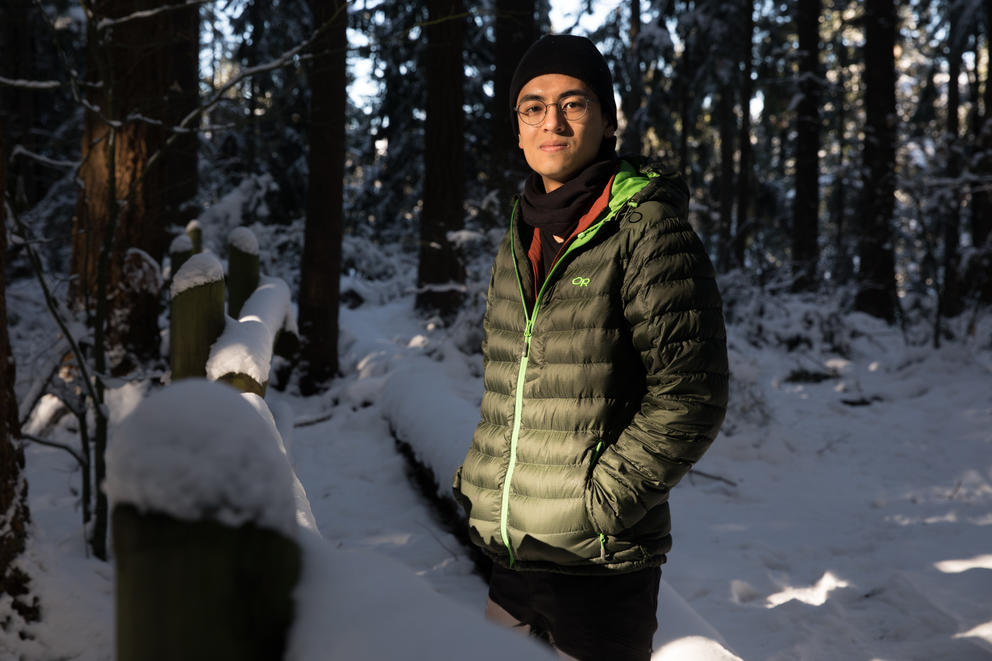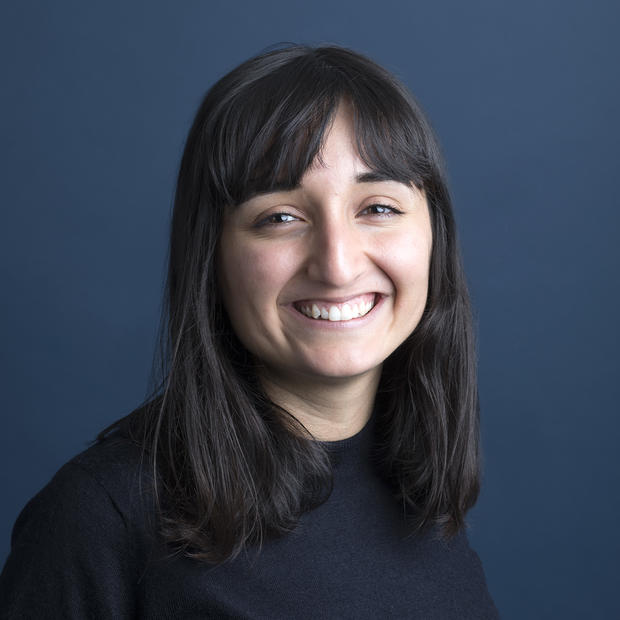So in 2016, he thought up Outdoor Asian and made the group’s first Facebook page. He says the group’s social media presence acted as a flag for others in the API community interested in his mission and once the group had staffers, they together founded Outdoor Asian as it is today.
The now 26-year-old Washingtonian helps run the group as its executive director, and he’s opened chapters in Oregon and Colorado as well. Chalaka chatted with Crosscut about his plans to grow even more this year, his outdoor experiences in Washington and the particularities of serving the Asian-Pacific Islander (API) community.
Crosscut: What were your early experiences with the outdoors?
Chalaka: I was born in Minnesota, but my family moved to Everett when I was 4. My earliest outdoor experiences were things like gathering blackberries off the sides of roads to make pie and my parents showing us how to gather apples that were rotting in our backyard, being consumed by wasps, to make other tasty things.
My parents both immigrated to the U.S. My dad came from south India, from Chennai, my mom came from Tamsui, Taiwan. They wanted to try out all the quote-unquote American things, like putting up Christmas lights and Thanksgiving and things like that. And one of those things was camping and hiking. So I was pretty fortunate — I was exposed to camping and hiking at a very young age. I remember climbing Mount Pilchuck and my dad giving me my first pocket knife when I did that.
But it wasn’t until high school that I had a friend who was already really interested in going outdoors that we started going out together. I did notice at the time that, even though there were lot of POC [people of color] who were doing outdoor activities like barbecues in the park or, say, blackberry foraging, there weren’t as many on the trails — especially as you went further into the backcountry. I think that definitely played a part, because it kind of set the norm of what the outdoors looked like to me. I often had a lot of white friends growing up who were climbing or doing extensive backpacking with their families, and my POC friends, not so much.
By the time you came up with the idea for Outdoor Asian, were you already an outdoorsy person?
I really loved the outdoors by that time. I continued to nurture that passion. In college I’d do these long-distance walks during our breaks ... and spend some time in the forest by my college. But when Outdoor Asian was started — I have this weird condition where my tendons have been having a failed healing response [known as Achilles tendinopathy], going on the last eight years. So when Outdoor Asian was started, it was getting worse, so I was sort of limited. I couldn’t do a lot of hiking, actually. I was actually indoors a lot. Outdoor Asian was sort of started during a time when I felt super limited and I still wanted to participate in the outdoor things and activities but I was stuck at home, thinking about the outdoors. [Laughs.]
So looking for a way to interact with the outdoors, even though you were limited, led to the founding of Outdoor Asian?
I think it was in conjunction with me being restless, stuck at home, unable to do outdoor things, as well as living in Albuquerque, New Mexico, where the few trails that I was able to go on, I actually noticed a lot of brown and POC folks speaking languages other than English on the trails with their families and kids. It really shifted my framework of what mainstream outdoor activities could look like coming from Washington. And then in addition to that, I'd heard of Outdoor Afro and Latino Outdoors and I was super inspired by them. I really wanted to join the Asian-Pacific Islander version of that.
So I Googled [and] there was nothing, no matter how hard I Googled, which really confused me. So I realized if I wanted to have that type of space or community, then I would have to start something on my own. Since I couldn't go outdoors anyway, I might as well. So it just started with a simple Facebook page. And then when I realized that I'd missed the boat, that the whole generation was already on Instagram, I had to make an Instagram as well, so I started featuring people's stories on that platform.
Is this really one of the only API outdoor organizations that you've come across, even now?
There are Asian vloggers, but there's no organization that's specifically trying to create this community to my knowledge.
Why is that?
Eddy [Kim] is our chapter manager in Colorado, and one of the reasons he got super into this was he was an outdoor retailer and he didn't see any Asians, hardly. He was like, "What is wrong with this picture?" Institutional racism sort of affects different minority groups differently, so being an Asian or Pacific Islander in the outdoors is a very different experience than being Black or Latinx. And then even just within the API community, they're going to have varying experiences.
Lots of outdoor organizations have popped up in the past decade, notably Outdoor Afro and Latino Outdoors. How does Outdoor Asian serve its specific audience?
Each of those organizations has a different history in the outdoors, so some of our outdoor activities that connect us to our past or our family's culture or our ancestors' outdoor practices will be different. Many of the API communities have a very strong fishing past, so a lot of API individuals connect to their pasts through fishing. A lot of community gardens, kitchen gardens, things like that.
But I think the thing that most comes to mind in terms of things that we have to watch out for is the language barrier. In the API community, there are so many languages because [we] literally encompass half the globe. Which brings up the question, what is Asian? What is Pacific Islander? What is the dichotomy between the two? What does that mean? And those are all good discussion questions for future workshops, but when it comes down to the practical sense, you have a community that may not share the same languages, which makes it hard sometimes when you want to do meetups. Especially when you try to do intergenerational meetups, when you have younger and older folks. Older folks may not know any English, but may speak different languages and might have trouble communicating.
That being said, most of our organizers are younger and have been born in the U.S. So we've had meetups where most of the folks tend to be younger side, so we haven't had too many issues with language. But it's definitely something we're actively moving toward and we're seeing on the horizon.
On your site, you focus a lot on resurfacing histories of nonwhite people in the outdoors. What’s the importance of that?
We have a history in the outdoors — it just looks like so many different things. It might look like traditional outdoor recreation, like the Japanese Camera Club in Seattle, or maybe in other arenas like art, like George Nakashima, who's the wood worker from Eastern Washington. It could look like labor, which is often, for the API community, in terms of building railroad tracks or [gathering] matsutake mushrooms in south Oregon or sugarcane in Hawaii. It could be spiritual — it just looks like so many different things and I think a big part of it is expanding our conception of it through looking at what our family's histories in the outdoors are and what did that look like.
How do people react when they reconnect to those histories?
Oftentimes [a] workshop ends in tears because it brings up very strong emotions. Our histories with the outdoors are not always limited to just playing in the mountains, which is often what's the narrative in the Pacific Northwest. Oftentimes it could be trauma in the ocean. Your parents may have been refugees who had to swim across the ocean, against sharks or people harming them. Or it can be healing — it can be a lot of different things. But it's frequent that it can be very powerful.
Do you feel like it's been that way in your own life?
Yeah, definitely. My mother grew up in sort of impoverished conditions in Taiwan. Her mother grew up in those conditions [and] also in war, with the U.S. bombing Taiwan, since Japan had occupied the country. So she has a very frugal wartime mindset because of that, and she's been a conservationist her whole life. But her conservation doesn't look like what we think about today. You might buy your compostable spoons but my mom [would] save McDonald's toys for the next generation. [She saved] them in a box for my children. ... In Taiwan [she had] a little garden that her mother and she took care of, with vegetables and I think a duck or chicken. .. When she's able to do that here, [she] continues that tradition of gardening, working with nature to survive basically. I kind of walked that path in my younger days by being really interested in farming and growing plants. ... But I never really got the green thumb. My mom, everything she touches grows but I cannot do that.
Are you hoping to expand this year in a big way?
There's just a lot of organizations wanting to partner with us, a lot of meetups that people are interested in participating in and there are workshops to be done, all kinds of stuff. So basically we're looking for more team members, because there's just so much work to be done in this space.
Is your goal to have a chapter in each state? Or is your aim different?
We have active chapters in Portland and in Denver, and we have people in other states who are interested in starting chapters. Those are Facebook groups starting to collect people who are interested, but I think to get a chapter started, you need at least two to three people who are interested in doing some of the actual coordination and organizing. So I'd say we only have three chapters right now.
What goals do you have for Outdoor Asian this year and beyond?
I think our goals right now — like the boring goals — are just trying to streamline the process, trying to figure out our 501(c)(3) status, insurance to protect participants and trip leaders, a lot of that. Trying to streamline a database for people who are subscribing and participating in trips and all that will make it a lot easier for chapters to start, so they don't have to reinvent the wheel.
Beyond that, I think just continuing to create relationships and friendships and have people meet people. I think the bedrock of community is sharing our similarities and differences with each other over a coffee, a beer, or a marshmallow. Those relations will probably outlast Outdoor Asian, so that's what's most important.








